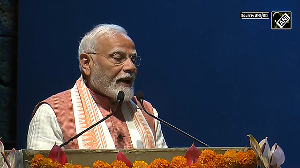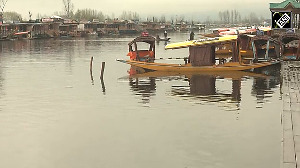Rajmohan Gandhi, grandson of Mahatma Gandhi, on Thursday said there is little chance of peace between India and Pakistan if religious intolerance is not checked in the two countries.
Addressing the inaugural session of the two-day Kashmir Peace Conference on Capitol Hill, he said one should not lose sight of the fact that there is fundamentalism in Pakistan and there is targeting of minorities in India.
Religious parties, he said, are in power in two of Pakistan's provinces and they seem keen on restrictive and retrogressive legislation.
On the other hand, in India the anti-Muslim and anti-Christian rhetoric, which at times includes direct call for murder, is increasing and not attracting the penal provisions of the law.
"Given this interconnection there is little chance of any Indo-Pak rapprochement if the Indian and Pakistani governments are unwilling or unable to check religious intolerance," he said.
Gandhi also drew the attention of the 200-odd people, most of them supporters of the Kashmiri American Council that organised the meeting and other similar outfits, to the violence near Vaishno Devi in Jammu and Kashmir last week. "I urge this conference to express itself clearly and strongly against violence and terrorism in Kashmir."
Gandhi, who is academic director, Global Crossroads, and visiting professor in the programme in South Asian and Middle Eastern Studies, University of Illinois, was the speaker on the first panel, titled 'Kashmir: Regional and International Dimensions'.
Other speakers included Sardar Abdul Qayyum Khan, former prime minister of Pakistan-occupied Kashmir and Ashraf Jahangir Qazi, Pakistani ambassador to the US.
Gandhi noted that demonising both India and the US is on the agenda of some of the elements in Pakistan. He said this intolerance in the subcontinent is also a subject that US lawmakers should take note of.
India, he said, will lose all right to claim the allegiance of the Muslim-majority Kashmir if it becomes a Hindu state. But at the same time, Gandhi said, the argument that because of its Muslim-majority Kashmir cannot possibly be a part of India should be questioned.
"India is not a nation solely or primarily for its Hindus. Unless India's Hindu extremists succeed in changing it, the Indian Constitution will continue to offer equal rights to Hindus, Muslims, Christians and others including atheists," Gandhi said.
He said he welcomed the conference knowing fully well the Indian government's stated position regarding Kashmir and the involvement of third parties. This formal position notwithstanding, India's leaders discuss Kashmir with the US and other nations and New Delhi regularly and rightly ask Washington to speak to Islamabad regarding terrorist acts in Kashmir.
"The United State's role may be one of facilitation rather than mediation; it may be largely of providing stimulus, yet this role by the US for peace in South Asia is of great importance," Gandhi said.
He was also of the view that the future of J&K is not something that the governments of India and Pakistan can decide without involving the people of Kashmir. "How this diverse people's representatives should be identified, and then associated with the process towards a possible settlement, are crucial if difficult questions are to be answered," he said. "But every human and democratic principle demands this association."






 © 2025
© 2025